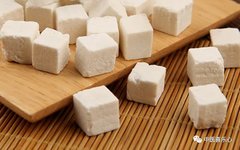
As the saying goes, “One tael of Fu Ling is worth one tael of gold.” The effects of Fu Ling are remarkable, and its applications are extensive, making it as precious as gold.
Fu Ling grows on the roots of pine trees, and the medicinal part is the dried sclerotium.
We often say that pines and cypresses promote longevity; pine trees remain evergreen throughout the seasons, gathering the energy of all four seasons.
Fu Ling, by residing on pine trees, absorbs the astringent energy of the pine, allowing it to thrive throughout the seasons and develop its own properties.
Fu Ling has a sweet and bland taste, is neutral in nature, and has the functions of promoting urination and draining dampness, benefiting the spleen and stomach, and calming the mind.
Ancient practitioners referred to it as the “divine medicine of all seasons” because of its broad efficacy, regardless of the season.
When combined with various herbs, it can exert its unique effects on ailments caused by cold, heat, wind, and dampness.
Human life activities cannot be separated from water; however, if dampness overflows in the body, yang energy cannot emerge, leading to illness.
Fu Ling can absorb excess, unnecessary, and erratic water from the body, improving the circulation of fluids.
In Traditional Chinese Medicine (TCM), many treatments focus on regulating water; once the water pathways are adjusted, the body feels unencumbered and at ease.
Eliminating dampness is accompanied by strengthening the spleen. It is not difficult to observe that Fu Ling grows hidden in the earth, endowed with the thick energy of the earth, thus it can nourish the spleen and enhance qi.
Compared to herbs like Bai Zhu (White Atractylodes) and Cang Zhu (Atractylodes), Fu Ling’s effect on strengthening the spleen is not as strong, but it is a commonly used auxiliary herb for treating spleen deficiency. Why is that?
Because the spleen governs transformation and transportation, spleen deficiency often leads to weak transformation, which can easily result in dampness, meaning that spleen deficiency often coexists with internal dampness.
At this time, it is necessary to both tonify the deficiency and eliminate the existing dampness; Fu Ling is a suitable auxiliary herb for this purpose.
Zhang Zhongjing recorded many treatment strategies in the “Shang Han Lun” (Treatise on Cold Damage), one important concept being the elimination of dampness. He clearly recognized the harm of dampness to the human body.
Among the formulas he listed, there is a dampness-eliminating formula: Ling Gui Zhu Gan Tang (Poria, Cinnamon Twig, Atractylodes, and Honey-Fried Licorice Decoction). Its effects are to warm yang, transform phlegm, strengthen the spleen, and drain dampness, primarily treating phlegm-dampness due to insufficient middle yang.
The composition of Ling Gui Zhu Gan Tang includes 12 grams of Fu Ling, along with 9 grams of Gui Zhi (Cinnamon Twig), 6 grams of Bai Zhu, and 6 grams of Zhi Gan Cao (Honey-Fried Licorice).
This formula prominently features the sweet and bland Fu Ling as the monarch herb, promoting spleen function and draining dampness. Gui Zhi serves as the minister, warming yang and harmonizing the qi.
Fu Ling and Gui Zhi work together to warm yang and promote fluid drainage.
Gui Zhi warms the yang energy, invigorating the body’s yang after eliminating dampness.
Bai Zhu, as a ministerial herb in the formula, uses its bitterness to dry dampness, while its sweet warmth nourishes the spleen and stomach, and promotes the circulation of fluids.
Zhi Gan Cao combines with Gui Zhi to assist in warming and tonifying middle yang, and with Bai Zhu to strengthen the spleen and enhance qi, as well as harmonizing the other herbs.
Although Ling Gui Zhu Gan Tang consists of only four herbs, and the quantities are not large, its effects are remarkable.
In addition to strengthening the spleen and eliminating dampness, Fu Ling also treats insomnia.
The “Shen Nong Ben Cao Jing” (Shen Nong’s Classic of Materia Medica) records that half of Fu Ling’s functions are to calm the mind, specifically treating symptoms related to the spirit, such as insomnia, palpitations, and restlessness.
Because Fu Ling comes from the pine tree, it inherits the calming energy of the pine, providing excellent effects in clearing the heart and calming the spirit, leading to restful sleep.
At the same time, Fu Ling can also eliminate the chaotic heart fire through its diuretic action. When heart fire is reduced, sleep improves.
According to the “Ben Cao Jing Shu” (Commentary on the Classic of Materia Medica), Fu Ling can “open the chest, regulate the organ qi, and nourish the heart and spleen.”
Fu Ling’s second major function is clearing the heart and calming the spirit, treating insomnia.
Tian Wang Bu Xin Dan (Heavenly Emperor’s Heart-Supplementing Pill) has the effects of nourishing yin, enriching blood, and calming the heart; this formula includes Fu Ling. It is primarily used for insomnia, palpitations, and vivid dreams caused by heart yin deficiency.
Fu Ling is also a medicinal food that can be combined with Bai Zhu, Ren Shen (Ginseng), and Dang Shen (Codonopsis) to better exert its effects of strengthening the spleen and draining dampness.
You can make Fu Ling porridge by crushing 10 grams of Fu Ling and 2 grams of Dang Shen, boiling them in water, and using the filtered water to cook the porridge.
Unlike other dampness-eliminating herbs, Fu Ling’s diuretic and damp-draining effects are achieved through strengthening the spleen and lung functions.
Moreover, its neutral nature allows it to both expel pathogens and support the body’s righteousness, draining dampness without harming the body’s integrity.
If symptoms of restlessness occur, accompanied by mental fatigue, weakness, pale complexion, irritability, and insomnia, Fu Ling is also effective.

